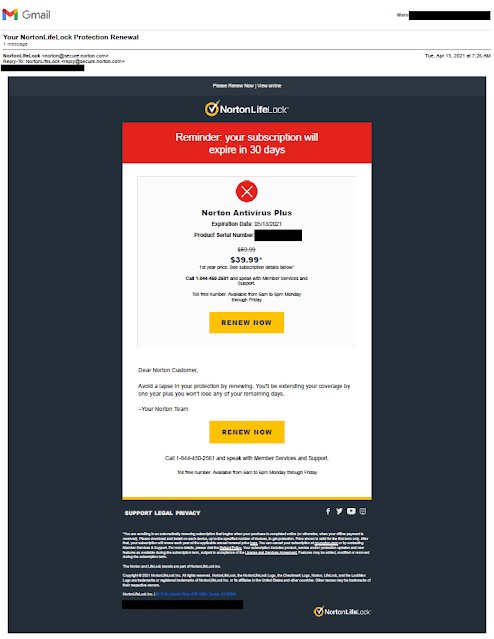Penn
& Teller had a show that ran for eight seasons: “Penn & Teller:
Bulls---!” According to Penn Jillette:
If
we said it was all scams we could also be in trouble, but 'bulls---,' oddly, is safe. So forgive all the 'bulls--- language', but we're trying to talk about
the truth without spending the rest of our lives in court."
This leads to a recent email I received from Norton. IMHO, it
goes beyond merely a Fail for Creative.
The email offers the customer an opportunity to review their
virus protection for $39.99, with an asterisk mentioning that this is the price
for just the first year. That asterisk references a Disclosure rendering in 4.5-point
font size:
I'll enlarge the fine print to a readable font size:
You are enrolling in an automatically renewing subscription that begins when your purchase is completed online (or otherwise, when your offline payment is received). Please download and install on each device, up to the specified number of devices, to get protection. Price shown is valid for the first term only. After that, your subscription will renew each year at the applicable annual renewal price here. You can cancel your subscription at my.norton.com or by contacting Member Services & Support. For more details, please visit the Refund Policy. Your subscription includes product, service and/or protection updates and new features as available during the subscription term, subject to acceptance of the License and Services Agreement. Features may be added, modified or removed during the subscription term.
So, to find out what the second-year price might be, I have to
search through literal mouseprint to find the correct link to learn that the
actual long-term price is currently expected to be* 50% greater than the advertised price.
Why isn’t
Norton upfront about this in the email? Is it perhaps that Norton believes customers
will not look for it now and just accept the higher price in a year?
An honest yet persuasive approach would be to explain the subscription option and offer $20 savings off the first year. The people at Norton know this -- they use this approach as landing pages from PPC ads.
When companies hide relevant information from customers, they
might get sales but they’ll also earn distrust. If I can’t trust Norton to be
forthcoming about its subscription price, can I trust it to protect my
computer? That's why I believe Norton's approach to disclosing prices to customers like this is bulls---.
* The header of the pricing landing page reads: "Our renewal prices for standalone and add-on subscriptions are listed below. They may change, but we will always send you a notification email prior to billing." In other words, the actual second year price in 12 months could be substantially greater than the price shown today.

